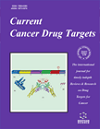- Home
- A-Z Publications
- Current Cancer Drug Targets
- Previous Issues
- Volume 8, Issue 1, 2008
Current Cancer Drug Targets - Volume 8, Issue 1, 2008
Volume 8, Issue 1, 2008
-
-
Editorial [Hot Topic: Akt Pathway in Oncogenesis and as a Target for Anti-Cancer Therapy (Guest Editor: Jin Q. Cheng) ]
More LessBy Jin Q. ChengThe first evidence that AKT plays a role in carcinogenesis was provided by the isolation of the transforming retrovirus from an AKR mouse T-cell lymphoma about thirty years ago [1], which was subsequently shown to contain transduced sequences of cellular origin. In early 1990, the intact viral oncogene, v-akt, was cloned [2]. The predicted oncoprotein encoded by v-akt harbored viral Gag sequences fused to a kinase relat Read More
-
-
-
Advances of AKT Pathway in Human Oncogenesis and as a Target for Anti-Cancer Drug Discovery
More LessAuthors: Lu-Hai Wang, George Z. Cheng, Sungman Park, Shaokun Shu, Lili He, William Kong, Weizhou Zhang, Zengqiang Yuan and Jin Q. ChengAKT (also known as PKB) plays a central role in a variety of cellular processes including cell growth, motility and survival in both normal and tumor cells. The AKT pathway is also instrumental in epithelial mesenchymal transitions (EMT) and angiogenesis during tumorigenesis. AKT functions as a cardinal nodal point for transducing extracellular (growth factors including insulin, IGF-1 and EGF ) and intracellular (such as mutated/act Read More
-
-
-
The PI3K/Akt Pathway: Recent Progress in the Development of ATP-Competitive and Allosteric Akt Kinase Inhibitors
More LessAuthors: Craig W. Lindsley, Stanley F. Barnett, Mark E. Layton and Mark T. BilodeauThis article describes recent advances in the development and biological evaluation of allosteric and ATP-competitive small molecule inhibitors for the serine/threonine kinase Akt (protein kinase B, PKB). Unregulated activation of the PI3K/Akt/PTEN pathway is a prominent feature of many human cancers and Akt is over-expressed or activated in all major cancers making Akt an exciting new target for cancer therapy. The d Read More
-
-
-
AKT Signaling in Regulating Angiogenesis
More LessAuthors: Bing-Hua Jiang and Ling-Zhi LiuAKT is a central signaling molecule in regulating cell survival, proliferation, tumor growth and angiogenesis. Upstream components of AKT signaling pathway such as PI3K, PTEN, and Ras are commonly mutated in many human cancers. Recently it is found that AKT plays an important role in regulating normal vascularization and pathological angiogenesis. Angiogenesis is required for tumor growth and metastasis when tumor Read More
-
-
-
Deregulation of the Akt Pathway in Human Cancer
More LessAkt (protein kinase B) is a serine/threonine kinase which is a central regulator of widely divergent cellular processes including proliferation, differentiation, migration, survival and metabolism. Akt is activated by a variety of stimuli, through growth factor receptors, in phosphatidylinositol 3-kinase (PI3K)-dependent manner. Akt is also negatively regulated by the tumor suppressor phosphatase and tensin homolog deleted o Read More
-
-
-
Cellular FLICE-Like Inhibitory Protein (C-FLIP): A Novel Target for Cancer Therapy
More LessAuthors: Ahmad R. Safa, Travis W. Day and Ching-Huang WuCellular FLICE-like inhibitory protein (c-FLIP) has been identified as a protease-dead, procaspase-8-like regulator of death ligand-induced apoptosis, based on observations that c-FLIP impedes tumor necrosis factor-α (TNF-α), Fas-L, and TNF-related apoptosis- inducing ligand (TRAIL)-induced apoptosis by binding to FADD and/or caspase-8 or -10 in a ligand-dependent fashion, which in turn prevents death-inducing signaling co Read More
-
-
-
Targeting P-glycoprotein for Effective Oral Anti-Cancer Chemotherapeutics
More LessOral anticancer drug treatment represents a significant change to current oncology practice. Support for oral anticancer treatment is driven by issues of pharmacoeconomics, accommodating the need for protracted drug administration for many emerging cytostatic therapies, response to patient preference and in improving patient quality of life. Much focus has concentrated on defining the cellular mechanisms underlying Read More
-
-
-
Inhibitors of Cyclin Dependent Kinases: Useful Targets for Cancer Treatment
More LessAuthors: P. S. Sharma, R. Sharma and R. TyagiCancer drug discovery is one of the most rapidly changing areas of pharmaceutical research. Uncontrolled proliferation is a hallmark of cancer cells. Over the past two decades, it has become increasingly clear that in many human cancers, hyperactivity of Cyclin Dependent Kinases (CDKs) is one of the mechanisms underlying the physiological hyper-proliferation. CDKs are serine/threonine protein kinases, which play an import Read More
-
-
-
Small Molecule Tyrosine Kinase Inhibitors: Potential Role in Pediatric Malignant Solid Tumors
More LessAuthors: Jochen Rossler, Birgit Geoerger, Melissa Taylor and Gilles VassalTyrosine kinase receptors are expressed on the surface of tumor and/or endothelial cells and represent attractive targets for new anti-cancer treatment strategies. The so-called “small molecule” tyrosine kinase inhibitors have been designed to interact with the intracellular ATP binding site of these receptors, subsequently causing arrest of tumor cell proliferation, as well as induction of apoptosis and tumor migration. Furthe Read More
-
Volumes & issues
-
Volume 25 (2025)
-
Volume 24 (2024)
-
Volume 23 (2023)
-
Volume 22 (2022)
-
Volume 21 (2021)
-
Volume 20 (2020)
-
Volume 19 (2019)
-
Volume 18 (2018)
-
Volume 17 (2017)
-
Volume 16 (2016)
-
Volume 15 (2015)
-
Volume 14 (2014)
-
Volume 13 (2013)
-
Volume 12 (2012)
-
Volume 11 (2011)
-
Volume 10 (2010)
-
Volume 9 (2009)
-
Volume 8 (2008)
-
Volume 7 (2007)
-
Volume 6 (2006)
-
Volume 5 (2005)
-
Volume 4 (2004)
-
Volume 3 (2003)
-
Volume 2 (2002)
-
Volume 1 (2001)
Most Read This Month
Article
content/journals/ccdt
Journal
10
5
false
en


